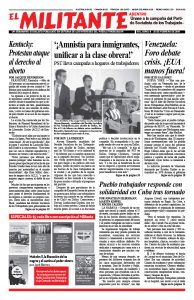AUCKLAND, New Zealand – Junior doctors — also known as Resident Medical Officers — picketed hospitals here Jan. 29-30 in their second nationwide strike in the last two weeks, fighting for safer working conditions. The action involved some 3,500 strikers.
The strikers included newly qualified doctors still training as well as those training to becoming specialists. Most work in public hospitals, with a few training to become family doctors.
After two strikes in 2017 the junior doctors union, the Resident Doctors’ Association, won a new contract with the District Health Boards that included reduced hours and a safer roster system. The contract allows them to work no more than 10 days at a stretch, no more than 16 hours a day and limits how many long days they can work per week. The health boards now want to weaken the union’s control over the new rosters.
“We know the strike means some surgery will have to be postponed, but we had no option,” Anthony Walters, currently working in renal medicine, told the Militant on the picket line outside Auckland City Hospital. “In the long run it is better for patients to be looked after by someone well rested.” Emergency and life-preserving services were maintained during the strike.
About six months ago some junior doctors opposed to the new rosters, formed a breakaway union, the Specialty Trainees of New Zealand. They signed a contract with the District Health Boards to work 12 days without a break, hoping they could graduate faster.
“Under our contract my training will probably take about six months longer,” Prateek Vadgaankar, a general medicine specialist trainee, said on the picket line. “But would you rather be trained well or trained fast?”
The Resident Doctors’ Association won support from the senior doctors union, the Association of Salaried Medical Specialists, and the New Zealand Nurses Organisation, which took strike action last year over working conditions. Junior doctors struck again Feb. 12-13 and plan a fourth strike later this month.

